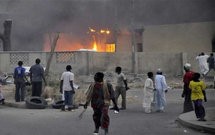 Fighting in Nigeria involving Islamist militant group Boko Haram has increased in recent days, after declining for most of July.
Fighting in Nigeria involving Islamist militant group Boko Haram has increased in recent days, after declining for most of July.
A particularly notable element in the violence has been the involvement of civilian vigilante groups -- armed militias in northern Nigeria that sometimes receive government support and that have conducted numerous attacks against Boko Haram over the past three months.
Though such groups can be useful for the military by supporting counterinsurgency operations, the government cannot fully control them, and their presence could perpetuate insecurity in Nigeria by undermining a tenuous cease-fire and worsening religious frictions in the region.
The Nigerian military has been waging a large-scale offensive against Boko Haram since early May, when Nigerian President Goodluck Jonathan declared a state of emergency in the northeastern Yobe, Adamawa and Borno states and deployed roughly 2,000 troops to the region.
During this time, while military forces have been operating throughout northeastern Nigeria under the cover of a total media blackout, a vigilante group called the Civilian Joint Task Force formed in the Borno state capital of Maiduguri -- a base of Boko Haram operations.
Civilian vigilante groups are common in Nigeria, and the Nigerian military has been known to provide them with limited training and use them to perform basic security tasks. While it is unclear if the Civilian Joint Task Force is receiving government support, the group has been particularly active since May.
On July 27 and July 28, for example, the militia raided the villages of Mainok and Dawashi in Maidiguri in search of Islamist militants. Boko Haram retaliated fiercely, reportedly killing 43 members of the civilian group in retaliatory attacks -- the deadliest known such incident involving vigilantes in Nigeria.
Until the most recent spike in violence, the tempo of attacks in northern Nigeria had indeed been slowing throughout July, likely due to the military's ongoing offensive in the northern states as well as the beginning of Ramadan, the Muslim holy month.
The decline in attacks could also validate claims made July 8 by the government that a cease-fire with Boko Haram had been reached. But if, in fact, the two sides have agreed to a truce, any such deal seems likely to be undermined by the emergence of the civilian militias.
The Nigerian government is already facing numerous constraints in its ability to reach and sustain a truce with Boko Haram. But the recent actions of the civilian vigilantes indicates that many in the northeast would not accept a cease-fire with the Islamist group and that the militias could sustain violent campaigns against Boko Haram and other Islamist militant groups if the government cannot secure the region.
The government's inability to control the civilian groups would thus undermine negotiations with Boko Haram, further limiting the likelihood of a lasting regional peace.
Already, the lull in violence since the cease-fire was ostensibly reached appears to have ended abruptly. On July 29, a bombing occurred in the northern city of Kano -- far from the civilian militia activities in Borno state -- though the attack may have been carried out by a different militant group such as Ansaru, which regularly conducts assaults in northern Nigeria as well, or a faction of Boko Haram that has refused to recognize the cease-fire. Moreover, government security operations against Boko Haram have continued elsewhere.
Notably, the government reportedly announced July 30 that it has detained 42 Boko Haram members -- an unusually high number of arrests -- in the southwestern Ogun and Lagos states.
Boko Haram normally does not operate in these areas of the country, but some of those arrested reportedly were attempting to establish cells in the two states. Such a move would present a geographic shift in Boko Haram activity that the group has attempted previously without success.
For the Nigerian military, mobilizing civilians may be useful if an all-out war were to break out with Boko Haram and its affiliates, since executing counterinsurgency campaigns requires a large geographic footprint to help control territory and disrupt militant flows.
But if attempts by the Nigerian government to negotiate a lasting peace agreement with Boko Haram are to ever succeed, the presence of armed militias that are not under the government's direct control could prove counterproductive.
Should the vigilantes, say, begin killing people suspected of being Boko Haram members or start raiding villages that lack Islamist links, their presence could alienate northern Nigerians and expand the Islamist militant group's recruiting base while making the conflict in Nigeria an increasingly ethnic one.
Courtesy : Stratfor (www.stratfor.com)